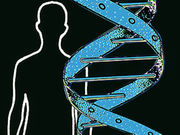Increased detection of heritable mutations over the predicted yield of testing based on guidelines
WEDNESDAY, Sept. 6, 2017 (HealthDay News) — Universal sequencing of a broad panel of cancer-related genes is associated with increased detection of potentially clinically significant heritable mutations, according to a study published online Sept. 5 in the Journal of the American Medical Association.
Diana Mandelker, M.D., Ph.D., from the Memorial Sloan Kettering Cancer Center in New York City, and colleagues examined the proportion of inherited variants detected using simultaneous sequencing of the tumor and normal tissue compared with genetic test results based on current guidelines. A total of 10,336 patients consented to tumor DNA sequencing, and 1,040 of these patients with advanced cancer were referred for germline analysis of 76 cancer predisposition genes.
The researchers found that 17.5 percent of the 1,040 patients (182 patients) had clinically actionable mutations conferring cancer susceptibility, including 149 patients with moderate- to high-penetrance mutations. Using clinical guidelines, 101 of the patients tested would not have had these mutations detected, including 65 with moderate- to high-penetrance mutations. In 38 patients tested, germline findings led to discussion or initiation of change to targeted therapy, while predictive testing was conducted in the families of 13 individuals, including six who would not have initiated genetic evaluation based on guideline-based testing.
“Knowledge of these additional mutations can help guide therapeutic and preventive interventions, but whether all of these interventions would improve outcomes for patients with cancer or their family members requires further study,” the authors write.
Several authors disclosed financial ties to the pharmaceutical industry.
Copyright © 2017 HealthDay. All rights reserved.








